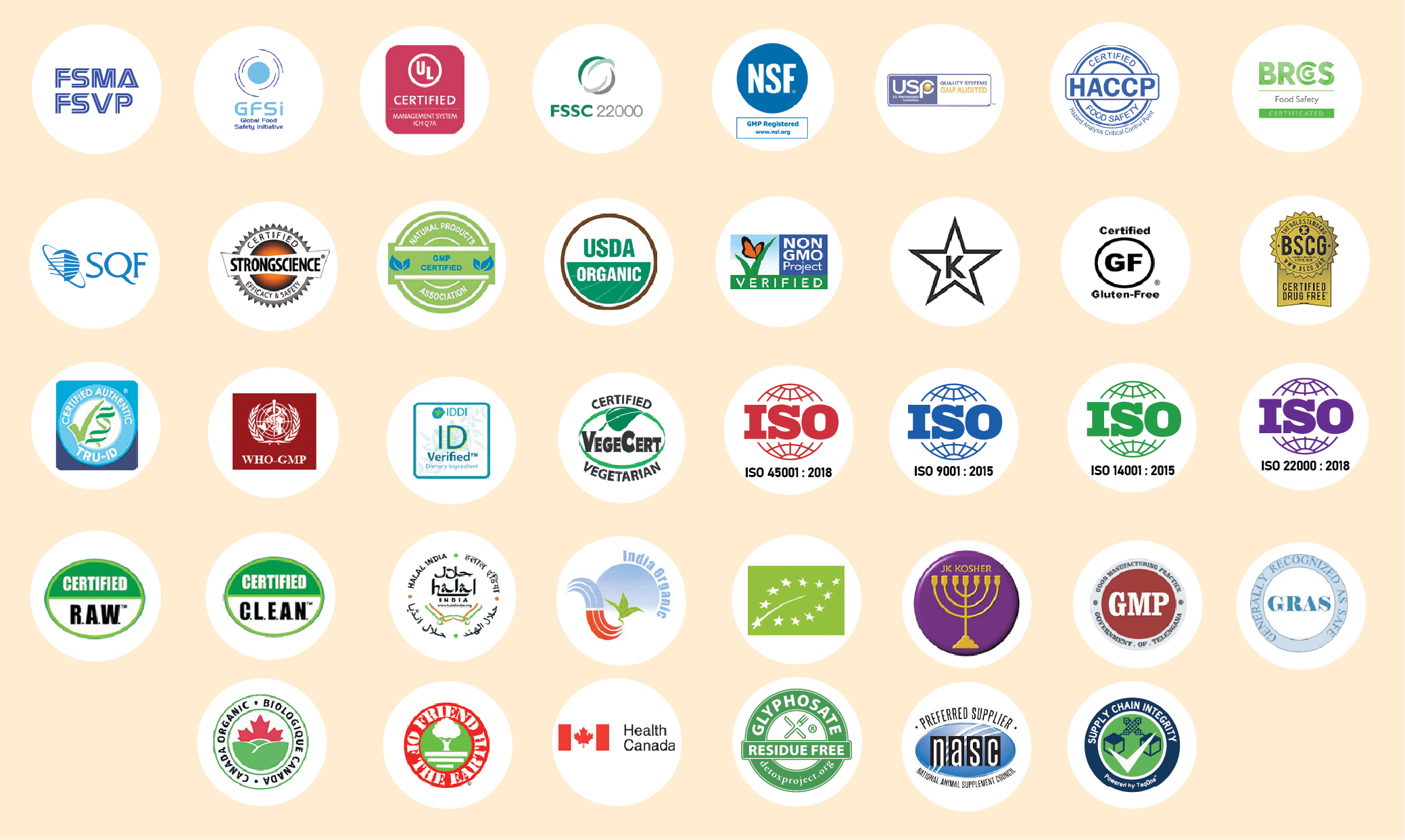With 36 certifications (and counting) KSM-66® Ashwagandha root is the indisputable leader in quality. Here’s what this means for your product.
KSM-66® has achieved its 36th quality control certification – STRONGSCIENCE® certification, which provides a Certification Mark for dietary supplements by assessing product claims against clinical, preclinical, and manufacturing information. And there are four more certifications coming soon to bring that total up to 40. There is perhaps no other botanical ingredient on the market that can claim this bounty of independent, third-party verifications.
Certifications: The Foundation of Quality
In today’s no-nonsense era, consumers want more evidence and validation not only in terms of therapeutic claims and scientific research but also in terms of the quality of the products. Undoubtedly, quality is becoming a necessity in today's marketplace pertaining to the manufacture of herbal and dietary supplements. Quality certifications provide some assurance that a company is committed to best practices in its production, testing, and supply chain.
Here’s why certifications matter: there are literally thousands of ingredients on the market sold by multitudes of companies including third-party brokers. Many raw materials are not regulated by FDA or any other regulatory authorities, meaning that there is no approval needed for market authorization of any of these ingredients from any regulatory bodies across the globe.
Thousands of ingredients are also imported into the US every single day. It's extremely difficult for finished product brands or marketing companies to audit their suppliers in these foreign countries. This process is expensive, resource-intensive, requires expertise, and is time-consuming. Realistically, it is not possible for federal agencies like FDA to inspect, approve and certify every manufacturing unit that produces these ingredients, and also certify the products. This is where independent credible third-party agencies play a pivotal role. Many such certification bodies like USP, NSF, UL, etc. command great respect by FDA and other agencies for their standards and rigor in the audit process.
These third-party certifications build the confidence and trust of both supplement brand makers as well as end consumers. Such certifications also demonstrate the commitment on behalf of the vendors and suppliers as they have to invest thousands of dollars to obtain and maintain these certifications every year. Certification logos are so much more than mere marketing tools, as they provide assurance to brand owners that the ingredient is safe, efficacious, tested, and validated.
Logos (as seen below) reflect investment, not just monetary, but of many resources and continual dedicated work. To demonstrate transparency, Ixoreal Biomed Inc. provides the certification documentation to interested customers. Certifications, therefore, are the quintessential foundation of quality control.

Defining Quality Control
The term “quality control” is often vague and misrepresented in B2B, and also, it is not adequately conveyed to consumers. Typically, consumers hold an amorphous perception of “quality” but have no real understanding of the significant importance of quality control in the dietary supplements (and other consumer products) they use.
This is an important distinction because when consumers understand what the various symbols are on product labels and on the brand websites, they can make more informed purchase decisions and will likely entrench those brand selection decisions. And, of course, the more your suppliers show that they prioritize quality control and can back that up with certifications, the easier it is to build that esteem among your target consumer networks.
Quality control, when demonstrable, is tangible evidence of transparency. A report from Pure Branding Inc. (Leverett, MA) entitled, “ROI of Transparency: A Consumer Market Research Study” stated that nearly three-quarters of consumers (73%) would be more likely to pay higher prices for a product they believe is more transparent. Also, some brands in the report said they reaped nearly 20% return on transparency-related goal achievements, such as certifications.
Further, according to the CDC’s National Health and Nutrition Examination Survey (Dietary Supplement Use Among Adults: United States, 2017-2018), “From 2007–2008 through 2017–2018, the prevalence of dietary supplement use increased in all age groups among U.S. adults.”
Certifications, for the robustly swelling populations of supplement users, are becoming increasingly in demand. The more certifications, the more transparent your supplier’s quality control protocol is.
By and large, quality control is somewhat “measurable” by the certifications the supplier has achieved. Certifications are a measure of exhibiting compliance to strict and rigid specifications. Earning a certification is proof of commitment to quality and to ultimately and optimally defining quality control. Ixoreal, the company that makes KSM-66 Ashwagandha root extract, has earned an astounding 36 distinct certifications, that when combined, represent a globally peerless ashwagandha ingredient.
In the US alone, there are more than 76,000 dietary supplement products for sale. In their article published in the Journal of the Academy of Nutrition and Dietetics (Akrabas SR et al, September 1, 2016), the authors write, “Given the size and diversity of the products and ingredients, the rapid pace with which new dietary supplements are introduced into the market, and the fact that FDA approval is not required before products are introduced to the market, independent third-party certification programs offer quality assurance for dietary supplements in the marketplace.”
Certifications for KSM-66® Ashwagandha root extract and its manufacturing facilities
KSM-66® and its manufacturing facilities have the following wide-spanning certifications:
Good Manufacturing Practices: GMP (USP, NSF, NPA-UL, WHO, Govt of Telangana). These certifications demonstrate that the supplier is committed to strict, rigid, and superior standards of manufacturing, processing, handling, testing, warehousing, and shipping.
Food Safety and Quality: FSMA-FSVP (Foreign Supplier Verification Program), GRAS, GFSI (FSSC 22000, BRC, SQF, HACCP), Non-GMO Project Verification, Gluten-Free, Halal, Kosher, Certified R.A.W, Certified C.L.E.A.N., BSCG Certified Drug-Free, Vegecert, and Glyphosate Residue Free. These certifications demonstrate that KSM-66® is safe for nearly all sensitivities experienced by people throughout the globe.
Organic: USDA, EU, Canada, India. More consumers are demanding organic supplements and ingredients, therefore organic certifications are required to be competitive in the long term.
ISO: ISO (9001, 14001, 22000, 45001). Certifications from The International Organization for Standardization demonstrate the ability to define and follow specific quality management systems and the ability to identify areas of improvement and act to make those improvements.
Sustainability and Transparency: Friend of the Earth, ID Verified, Tru ID, Tag One. Showing ecological and social stewardship and ensuring sustainability will engender higher esteem and loyalty to your product and brand. KSM-66 uses a blockchain-enabled supply chain platform called TagOne, which enables to trace and validate the entire supply chain, starting from seed to the sale to a customer.
Quality control (QC) begins at the ingredient supply level – in the fields where the raw material is seeded, sown, and processed – and doesn’t end as quality control also encompasses continuing communications to ensure there are no issues in the manufacturing partnership.







